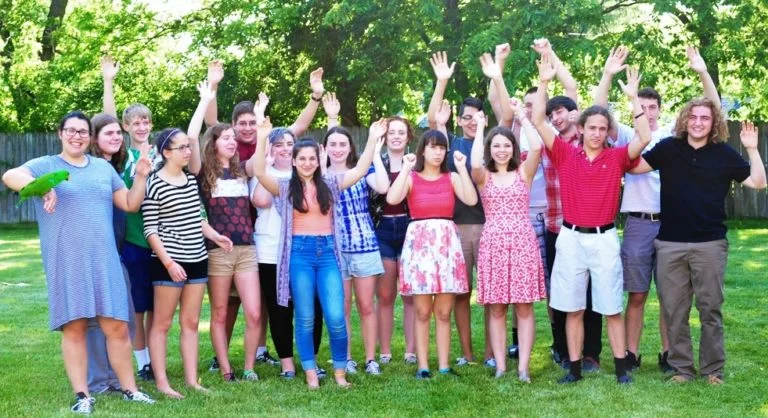There is little doubt that, as members of the national, American community, we are living through a period of great strife. Without even straying into the enormous social, economic, or security-based issues with which we now struggle, I feel it is safe to note that we must confront a challenging reality: Many in our society are too ready to assume the worst of those with whom they disagree politically…
Read MoreThere are at least a couple of ways to interpret Proverbs 22:6, which reads: Teach a child according to his way; even when he grows old he will not stray from it. It might be (and is often thought of as) a suggestion that we should personalize our educational efforts—that if we teach a child according to his way, then he or she will not stray from it. However, another way that we can understand this verse is the following: If we make a point of reaching our children, then we can be more certain that they will know how to survive and thrive as they grow up…
Read MoreNow that it is December, we are nearly halfway done with our first year of Makor- I can hardly believe it! I have spoken (and written) before about the way we have integrated a variety of electives into our Sunday programming to make our educational process more holistic. This month, I would like to better explain one of the key new aspects of Makor: The eponymously-named “Makor Program.”
Read MoreNovember has arrived, and we are at the precipice of Decision 2016. Our “big” decision, in theory, is regarding who will be our next president. This is a topic about which we have been hearing for months on end. However, I would like to suggest that there are, in fact, bigger decisions that we face, and that they are decisions we face much more regularly than the electoral variety…
Read MoreThe use of food to evoke emotions and thoughts about a specific time of year should be quite familiar to us as Jews. At its most basic level, Jewish culture has used food as a marker of Jewish uniqueness for, literally, thousands of years.
Read MoreI cannot help but wonder how early Jewish tradition would deal with the reality of Jewish Olympians such as Aly Raisman, Or Sasson, or Yarden Gerbi being so prominently celebrated in the recent Summer Olympics. Should we feel that, even though these men and women may be physical inspirations, they should not be hailed as major successes as Jews qua Jews? Put another way, how should we feel about Jewish Olympians: Are they impressive Olympians who just happen to be Jewish, or are they—by virtue of their success in an exciting, high-profile arena—paradigms of how to successfully be a Jew?
Read MoreIn tractate Kiddushin, the Babylonian Talmud discusses five things that parents are obligated to do for their children. These include two rituals requirements (to perform the rites of circumcision the traditional redemption ritual for first born boys), one moral education requirement (specifically, to teach children Torah), and two steps to prepare children for a successful life (to find them a spouse, and to teach them a trade). There exists, however, a divergent voice in the Talmud which interjects and adds to this list: A sixth obligation, according to this source, is to teach children to swim…
Read MoreThe 22nd chapter of Deuteronomy contains a commandment that is very brief, but that has been discussed at great length by Jewish commentators. Verses 6 and 7 of this chapter read: If you come across a bird’s nest beside the road, either in a tree or on the ground, and the mother is sitting on the young or on the eggs, do not take the mother with the young. You may take the young, but be sure to let the mother go, so that it may go well with you and you may have a long life. This mitzvah (which comes to be known as shiluach ha-ken, ‘the sending off of the nest’) represents one of the more important statements of Jewish ethics in the Torah.
Read MoreThe Talmud records this discussion:
“[One’s teacher]—this means a teacher who taught him wisdom, but not the teacher who taught him Scripture or Mishnah”—these are the words of Rabbi Meir. Rabbi Judah says: “Anyone from whom most of a person’s teaching comes [counts as his teacher.]” Rabbi Yosi says: “Even if a teacher only enlightened a student’s eyes with a single teaching, he counts as his teacher.”
Read on to learn more about what exactly it meant.
Read MoreThe Education Committee has decided to radically re-imagine how we run Temple Beth Or’s religious school; starting in the fall, we will be transforming our school to reflect this. In many ways, the model to which we are shifting is more camp-like, especially in that we are working hard to integrate activity and discussion into our students’ educational experience.
Read MoreEven as Reform Jews define themselves in a vastly different fashion than Jews of earlier generations and different times (those who may have had compunction engaging openly in non-Jewish celebrations), we still work to discern when certain practices or behaviors might be beyond the pale. In particular, even in Reform Jewish dialogue, we still occasionally have lively disagreement about whether some non-Jewish customs or celebrations should be permitted…
Read MorePirkei Avot, a well-known collection of rabbinic sayings, teaches us: “Who is rich? He who is happy with what he has.” Why then—I wonder—did I feel compelled to buy a Powerball ticket when the jackpot reached a tantalizing 1.5 billion dollars? By doing so, was I suggesting that I was not satisfied with what was mine? Was I, in buying a lottery ticket, showing that I am truly at odds with the ethos of Judaism?
Read MoreBelieve it or not, in the ancient world, there were people who considered sleep a fraught activity. In the Babylonian Talmud, the ancient rabbis state that ‘sleep is like one-sixtieth of death.’ However, while the rabbis might have considered sleep dangerous, they also saw in it important potential…
Read More












